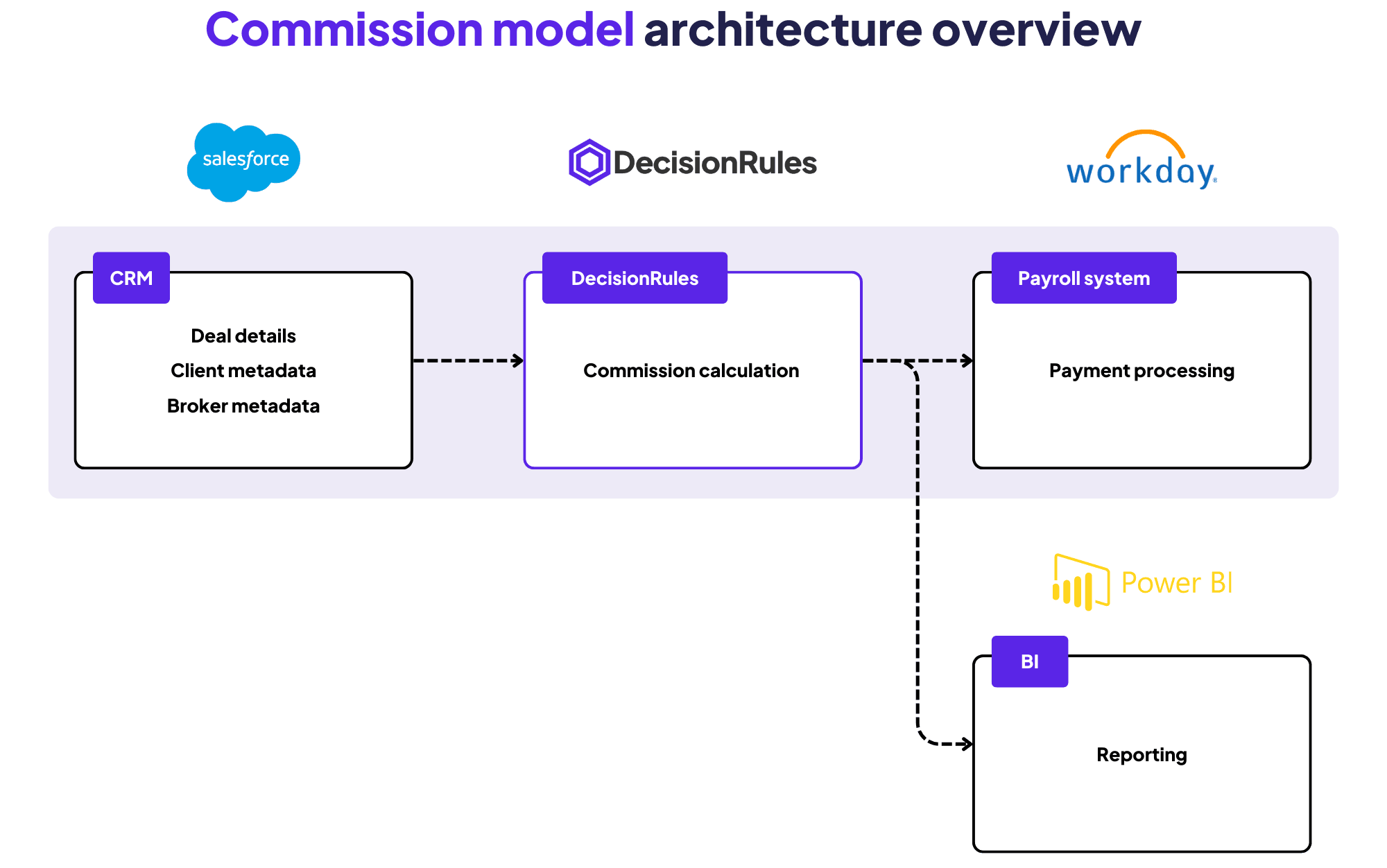Case study
There are numerous commission models, defined in various tools, and only the successful ones share common traits:
- They leverage complex business logic which defines rules
- They enable various means of data integration
- They allow rapid changes in rules
- They provide a range of reports because 'Only what you can measure is what you can manage'
While a commission model can be defined in a simple manner, if a business wants to react with flexibility to the market situation and motivate its salespeople, it should leverage some logic
One of the key benefits of using a business rule engine in a commission model is the ability to easily define and modify business rules, even by business users, and that is exactly what DecisionRules enables. Additionally, a business rule engine provides transparency and traceability, as the rules can be documented, audited, and version-controlled, ensuring compliance and facilitating effective communication across teams.
Business Requirements
There are about a dozen standard commission models, let’s select three that could be used in the financial industry for selling bank products.
The commission strategy combines more standard commission models. Straight commission for closing the deal, Residual commission for performing long-term deals and Revenue commission for products like loans. In this strategy, there will be three separate Commissions calculated:
- Sales Commission - non recurring commissions provided for each deal fulfilling defined conditions. A good example would be opening a new contract with some maintenance fees included. The commission would be evaluated and paid on a regular basis, but there should be a possibility for a broker to precalculate a commission online to motivate him for a deal.
- Merit Commission (part of the Residual Commission model) provides for long lasting deals.This commission can motivate brokers to retain customers for existing products by rewarding them based on customer performance. Evaluation is based on larger bulks of long-running contracts.
- Revenue Commission provides for the total volume of sales during the defined period. There is a different logic in calculation than shown in the previous two cases. The input in this calculation is the aggregated data for each broker, not a single deal. The source for this type of commission is the aggregated data in the form of larger bulks.
In every commission model there are more rules that will decide if the commission is to be granted and how generous it could be.
Commission rules
1. Sales Commission
Current Account sale
A basic example of a sales commission awarded to a broker for opening a new current account for a client.
Additional conditions:
- the account is active at the end of commission period
- maintenance fees were paid
Commission amount is fixed
Loan sale
A commission awarded for arranging the loan.
Additional conditions:
- the loan has been drawn down, at least from defined percentage
- maintenance fees were paid
Commission amount defined percentage of credit facility
2. Merit Commission
Performing Current Account
Commission calculated in account open anniversary awarded for performing account.
Conditions:
- maintenance fees are paid during passed year
Commission amount is fixed
Current Account of Mass affluent client
Commission for a current account with additional conditions client must pass.
Conditions:
- maintenance fees are paid during passed year
- the average account balance in the last 12 months is 10.000 EUR
Commission amount is fixed
Performing Loan
A commission calculated in account open anniversary awarded for a well performing loan.
Conditions:
- loan is still open or has been regularly paid off
- maximal 30 days past due of installment
Commission amount defined percentage of loan amount
3. Revenue Commission
New Clients
Commission evaluated every year
Conditions:
- Number of new clients opening any account in the past year reaches the threshold
Commission amount is fixed
Loans sold
Commission evaluated every year
Conditions:
- Volume of loans sold in the past year
- Loans paid off prematurely are excluded
Commission amount is a defined percentage of the total volume
Reports
Sales, and commissions in particular, must be closely monitored to maintain the balance between broker and the stakeholder needs. To this purpose, some reports have to be created.
The solution will provide a set of reports of commissions which have been awarded along with detailed information as to why a single commission was provided (or not).
- Report of commissions granted will present amounts of provisions per:
- each broker
- type of product (account, loan)
- type of commission
- Detailed report of commission assigned (or not) for every deal. Showing details of rules passed or failed. This kind of report will be used to judge possible complaints.
Commission evaluation and payment
A commission evaluation process would start once a month after each month's closure. Calculated commissions would be a basis for a payment system on one hand and reports on the other.
There would be another possibility which is to calculate the commission in advance. For external salespeople who sell our products, as well as those of our competitors, this should motivate them to prefer our products. In this case we will provide the ability to calculate the amount of commission if they sell our product.
Solution architecture
The whole solution will consist of several components; the crucial one, which will define the business logic, is DecisionRules.io. The possibility of SaaS or on-prem installation and online integration will provide various possibilities from complete on-premise through hybrid cloud infrastructure to a fully cloud solution.

Data sources
To create a comprehensive solution, typically various source systems are required; which is why we have decided to leverage a data warehouse as the ultimate source. The data warehouse consolidates and integrates data from multiple systems, providing a unified and reliable source of truth of both product data and all metadata needed for reporting.
The data warehouse is not a mandatory component but it is highly recommended. What we need is a source of sales data with some history of our client’s behavior so many other reporting solutions capable of some aggregations are good to go.
Integration layer
DecisionRules.io is integrated with Restful API. It has many benefits but is not ideal for large batch processing. This is why we utilize a service that will take the data from the data warehouse and process them in the form of chunks. Using this service, we are able to balance the workload on DecisionRules.io and also easily handle eventual issues during the process.
There are a number of possibilities when it comes to the integration of services such as DecisionRules.io. The best solution always depends on the ecosystem which the company has implements, and the scale of data that will be transferred:
- for on-premise infrastructure: WSO2, boomi
- when situated in Azure: Azure Logic Apps, Azure Functions, Azure Data Factory
- when situated in AWS: AWS Lambda, AWS Step Functions, Amazon SQS
Database storage
An optional but recommended component of the whole solution is data storage. The results from commission calculations can be stored in system logs where all of the necessary details are available. DecisionRules takes care of log data retention and that is why for minimal viable products this can be an ideal possibility.
If the commission results need to be stored for longer periods of time or other systems in the organization need to digest the data, an external data storage for data logs is recommended.
Reporting
For reporting purposes, we have decided to use Power BI as a standard reporting tool. It will digest data from:
- data warehouse as a single source of truth in organization
- deal details
- metadata
- history of commission transactions
- DecisionRules.io
- log data which hold the details about every commission evaluation
Power BI can easily digest various formats of data and logs from DecisionRules. It will be a good tool to quickly create the first prototype report, and when data from DecisionRules are in business, can be involved in the process of self-service BI.
Once again, Power BI is not the only tool capable of reporting from data in DecisionRules.io. It is just our tool of choice. Most of today's reporting solutions will be able to undertake the task with confidence.
More details comming soon
This article is the first part of a series that will tackle commissions. In the next one, we will describe the real solution in DecisionRules.io.

Pavel Wasserbauer
Business Intelligence Lead
